- About
-
Advocacy
- Submit Legislative Proposals to the ILA Public Policy Committee
- Advocacy Policies and Procedures
- More Than a Building
- Census 2020 Resources
- Creating or Changing Illinois State Library Law
- Illinois Minimum Wage Resources
- Intro to Property Taxes for IL Libraries
- ILA Public Policy Principles
- Legislative Issues
- Libraries and Immigration Enforcement
- Making Your Case
- Ready, Set, Advocate
- TIFs and Public Library Districts in Illinois
- Top Ten Advocacy Tips
- Unite Against Book Bans in Illinois
-
Committees
- Frequently Asked Questions (FAQ) about ILA Committees
- Advocacy Committee
- Awards Committee
- Conference Program Committee, 2025
- Conference Program Committee, 2026
- Diversity Committee
- Finance Committee
- Fundraising Committee
- ILA Reporter Advisory Committee
- Illinois Libraries Present Committee
- Illinois Public Library Standards Committee
- Intellectual Freedom Committee
- iREAD Committee
- Nominating Committee
- Public Policy Committee
- Reaching Forward North Committee
- Reaching Forward South Committee
- Events
-
Forums
- Frequently Asked Questions (FAQ) about ILA Forums
- Human Resources & Administration Forum (HRAF)
- Illinois Association of College & Research Libraries Forum (IACRL)
- Library Trustee Forum (LTF)
- Marketing Forum (MF)
- Resources & Technical Services Forum (RTSF)
- Retired Members Forum
- Small and Rural Libraries Forum (SARL)
- Students and New Professionals Forum (SANP)
- Young Adult Services Forum (YASF)
- Youth Services Forum (YSF)
- Initiatives
- Membership
- Publications
This bibliography represents books challenged, restricted, removed, or banned in 2013 and 2014 as reported in the Newsletter on Intellectual Freedom from May 2013 to March 2014, by Robert P. Doyle. (Dates prior to May 2013 indicate the controversy began earlier, but continued into 2013 or 2014.)
Download PDF (804 KB)
Alexie, Sherman
The Absolutely True Diary of a Part-Time Indian
Thorndike Press; Little, Brown
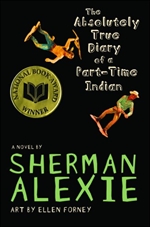
Removed as required reading in a Queens, N.Y. middle school (2013) because the book included excerpts on masturbation. The book, which tells the story of a Native American who transfers into an all-white high school, won the 2007 National Book Foundation award for Young People’s Literature. Challenged on the tenth-grade required reading list at Skyview High School in Billings, Mt. (2013) because “[t]his book is, shockingly, written by a Native American who reinforces all the negative stereotypes of his people and does it from the crude, obscene, and unfiltered viewpoint of a ninth-grader growing up on the reservation.” Pulled from the Jefferson County, W.V. schools (2013) because a parent complained about the novel’s graphic nature. Challenged in a Sweet Home, Oreg. Junior High English class (2014) because of concerns about its content, particularly what some parents see as the objectification of women and young girls, and the way alternative lessons were developed and presented. Parents of the eighth-graders in the language arts classes received information summarizing the novel’s most controversial issues before the unit started and had the option of asking for an alternative assignment.
Source: Newsletter on Intellectual Freedom, Sept. 2013, p. 185; Jan. 2014, pp. 10-11, 14; Mar. 2014, p. 49.
Allende, Isabel
The House of the Spirits
Dial Press Trade Paperback
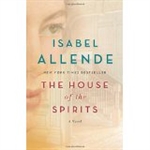
Challenged in the Watauga County, N.C. High School (2013) curriculum because of the book’s graphic nature. After a five-month process, the book was fully retained at a third and final appeal hearing. Published in 1982, the bestseller was critically acclaimed and catapulted Allende to literary stardom. The novel was named Best Novel of the Year in Chile in 1982, and Allende received the country’s Panorama Literario award. It has been translated into over thirty-seven languages.
Source: Newsletter on Intellectual Freedom, Jan. 2014, pp. 27-28; Mar. 2014, pp. 66-68.
Anaya, Rodolfo
Bless Me, Ultima
Warner Books
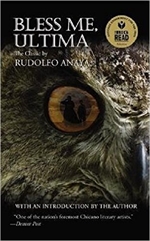
Retained in the Teton High School sophomore English class in Driggs, Idaho (2013) despite concerns about the novel’s mature content. Anaya’s best-known work, it was awarded the prestigious Premio Quinto Sol. President George W. Bush awarded Anaya the National Medal of Arts in 2002. In 2008, it was one of twelve classic American novels selected for The Big Read, a community-reading program sponsored by the National Endowment for the Arts, and in 2009, it was in the list of the United States Academic Decathlon.
Source: Newsletter on Intellectual Freedom, Jan. 2014, pp. 26-27.
Atwood, Margaret
The Handmaid’s Tale
McClelland and Stewart

Challenged, but retained as required reading for a Page High School International Baccalaureate class and as optional reading for Advanced Placement reading courses at Grimsley High School in Guilford County, N.C. (2012) because the book was “sexually explicit, violently graphic and morally corrupt.” Some parents thought the book is “detrimental to Christian values.” The novel won the 1985 Governor General’s Award in Canada and the first Arthur C. Clarke Award in 1987; it was also nominated for the 1986 Nebula Award, the 1986 Booker Prize, and the 1987 Prometheus Award. It has been adapted for the cinema, radio, opera, and stage.
Source: Newsletter on Intellectual Freedom, Jan. 2013, p. 11; Nov. 2013, pp. 244-45.
Aylisli, Akram
Stone Dreams
Novella published in Druzhba Narodov (Friendship of the Peoples)
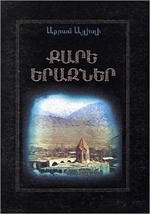
Burned (2013) at various locations around Azerbaijan. The novella is sympathetic to Armenians and recounts Azeri atrocities in the war between Azerbaijan and Armenia twenty years ago. Azerbaijani President Ilham Aliyev stripped the author of his title of “People’s Writer” and the pension that goes with it. A pro-government political party in Baku, Azerbaijan, announced that it would pay $12,700 to anyone who cuts off the ear of the 75-year-old novelist for portraying Azerbaijanis as savages.
Source: Newsletter on Intellectual Freedom, May 2013, pp. 108-9.
Chbosky, Stephen
The Perks of Being a Wallflower
Pocket Books

Removed from eighth-grade classrooms at Hadley Junior High School in Glen Ellyn, Ill. (2013) because of concerns about sexually explicit content and language. In June, the Glen Ellyn Elementary District 41 School Board overturned the decision and returned the book to the library shelves. Most board members were willing to reinstate the book after assurances from district administrators that a revised parental notification letter would be sent at the start of each school year warning parents that their children could be getting access to sometimes mature content in classroom libraries. Published in 1999, the coming-of-age tale is about an introspective fifteen-year-old high school freshman who writes letters to an anonymous friend. Intelligent beyond his years, he is an unconventional thinker; yet, as the story begins, Charlie is also shy and unpopular. In 2012, a film adaptation of the novel was released to positive critical response and commercial success. The film won numerous awards. Challenged on a summer reading list for incoming freshmen at Wharton High School in Tampa, Fla. (2013) because “it deals with sexual situations and drug use.”
Source: Newsletter on Intellectual Freedom, July 2013, pp. 143-44; Sept. 2013, pp. 184, 201.
Ellis, Elisabeth Gaynor, and Anthony Esler
World History
Prentice-Hall
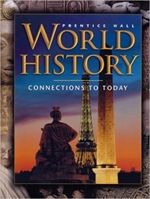
Challenged, but retained in the Volusia County, Fla. high schools (2013) despite a thirty-two-page chapter on “Muslim Civilizations” that covers the rise of Islam and the building of a Muslim empire. Protesters believe the Volusia high schools are using the world history textbook to “indoctrinate” students into the Islamic religion and recommend student volunteers tear the chapter out of the 1,000-page book.
Source: Newsletter on Intellectual Freedom, Jan. 2014, pp. 9-10.
Ellison, Ralph
Invisible Man
Random House

Challenged, but retained on the shelves of the Randolph County, N.C. high school libraries (2013) despite the book’s strong language. Ellison won the National Book Award for Fiction in 1953. In 1998, the Modern Library ranked the novel nineteenth on its list of the 100 best English-language novels of the twentieth century. Time magazine included the novel in its TIME 100 Best English-language Novels from 1923 to 2005.
Source: Newsletter on Intellectual Freedom, Nov. 2013, pp. 242-43.
Erlbach, Arlene
The Middle School Survival Guide
Walker & Co.

Removed from the Walnut Street School library in Delanco, N.J. (2013) because “the book provided too much information about sexual issues for middle school students.”
Source: Newsletter on Intellectual Freedom, July 2013, p. 141.
Follett, Ken
The Pillars of the Earth
Macmillan

Pulled from a senior English honors class in the Troy, Penn. Area School District (2013) after parent objections. The objections concerned material of a sexual nature in the book that the parents deemed inappropriate. Published in 1989, the historical novel, set in the middle of the twelfth century, is about the building of a cathedral in the town of Kingsbridge, England. The book was selected for Oprah’s Book Club in 2007.
Source: Newsletter on Intellectual Freedom, Nov. 2013, pp. 219-20.
Frank, Anne
Anne Frank: The Diary of a Young Girl
Doubleday
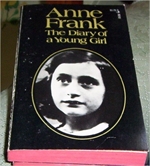
Challenged, but retained in the Northville, Mich. middle schools (2013) despite anatomical descriptions in the book. Before the school district’s vote, ten free speech organizations signed a letter urging the Northville School District to keep the book. The letter, which was sent to the superintendent and board of education members, “emphasized the power and relatability of Frank’s diary for middle school students. Frank’s honest writings about her body and the changes she was undergoing during her two-year period of hiding from the Nazis in Amsterdam can serve as an excellent resource for students themselves undergoing these changes.” The diary has now been published in more than sixty different languages and is on several lists of the top books of the twentieth century.
Source: Newsletter on Intellectual Freedom, July 2013, p. 163.
Gaiman, Neil
Neverwhere
BBC Books

Temporarily removed from the Alamogordo, N.Mex. High School library and curriculum (2013) because of what one parent calls “inappropriate content.” The British author wrote in The Guardian: “Well-meaning adults can easily destroy a child’s love of reading. Stop them reading what they enjoy or give them worthy-but-dull books that you like—the twenty-first-century equivalents of Victorian ’improving’ literature—you’ll wind up with a generation convinced that reading is uncool and, worse, unpleasant.”
Source: Newsletter on Intellectual Freedom, Nov. 2013, pp. 217-18.
Green, John
Looking for Alaska
Speak

Challenged in the Verona, N.J. High School curriculum (2013) because a parent found the sexual nature of the story inappropriate. The book was a New York Times bestseller and won the 2006 Michael L. Printz Award for excellence in young adult literature.
Source: Newsletter on Intellectual Freedom, Nov. 2013, pp. 218-19.
Ignatow, Amy
The Popularity Papers
Amulet

Challenged, but retained at two Prosser, Wash. elementary school libraries (2013). Only available to fifth-graders, the story is written in a journal format and drawn by the two main characters who want to unlock the secrets to being popular in middle school. One of the girls has two fathers; the other has only a mother. The American Library Association’s Rainbow Project selected it as a top-ten title for 2011. It was a 2010 National Parenting Publications Association Gold Award winner and selected by the Chicago Public Library as one of the 2011 “Best of the Best” books.
Source: Newsletter on Intellectual Freedom, May 2013, p. 124.
Lyga, Barry
I Hunt Killers
Little, Brown Books for Young Readers

Challenged on the Lexington, Ky. Henry Clay High School reading list (2013) because it is too violent for teens. The book is listed on the Kentucky Bluegrass Awards for ninth through twelfth grades.
Source: Newsletter on Intellectual Freedom, Jan. 2014, p. 10.
Morrison, Toni
Bluest Eye
Knopf; NAL

Challenged in Legacy High School’s Advanced Placement English classes in Adams County, Colo. (2013) because it was a “bad book.” A notice was sent home to let parents and students know what they would be reading and why and an alternate assignment was offered to those who wanted it. Half a dozen students of about 150 opted to read one of the alternative texts and received instruction on those works outside of class time. Challenged on a suggested reading list for Columbus, Ohio high school students (2013) by the school board president because it is inappropriate for the school board to “even be associated with it.” A fellow board member described the book as having “an underlying socialist-communist agenda.” Morrison is an Ohio native, Pulitzer Prize-winning author, and Nobel laureate.
Source: Newsletter on Intellectual Freedom, Sept. 2013, p. 184; Nov. 2013, p. 219.
Myers, Walter Dean
Fallen Angels
Scholastic

Challenged on the Danbury Middle School reading list in Toledo, Ohio (2013) because of inappropriate language. The book depicts the reality of the Vietnam War, with sometimes gruesome descriptions of combat and frequent foul language from soldiers. It won the 1988 Coretta Scott King Award.
Source: Newsletter on Intellectual Freedom, May 2013, p. 104.
Naylor, Phyllis Reynolds
Intensely Alice
Atheneum Books for Young Readers; Simon Pulse

Challenged, but retained in the Buffalo, Mo. middle school (2013) despite the principal’s formal complaint against several “very questionable pages” featuring a safe sex scene.
Source: Newsletter on Intellectual Freedom, May 2013, pp. 123-24.
Othman, Norani, ed.
Muslim Women and the Challenges of Islamic Extremism
Sisters in Islam
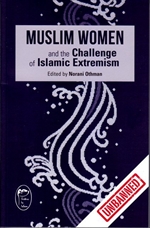
Banned by the Malaysian Ministry of Home Affairs (2008) on the grounds that it was “prejudicial to public order” and that it could confuse Muslims, particularly Muslim women. The Malaysian High Court overturned the ban on January 25, 2010, and on March 14, 2013, the Federal Court threw out the government’s appeal to reinstate the ban.
Source: Newsletter on Intellectual Freedom, May 2013, pp. 125-26.
Rivera, Tomas
And the Earth Did Not Devour Him
Hampton-Brown
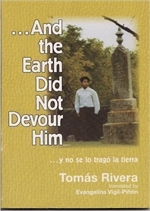
Challenged, but retained as part of the Clarke County, Ga. schools class reading list (2013) despite that “a paragraph in the book full of offensive language.” The book is the story of a Mexican boy’s life in a migrant family in the 1940s and 1950s, with themes of family life and tensions, getting an education, and growing up. In 1970 Rivera’s book won the Premio Quinto Sol literary award, established by a California publisher to encourage and promote Chicano authors.
Source: Newsletter on Intellectual Freedom, Sept. 2013, pp. 184-85; Nov. 2013, p. 244.
Rosen, Lucy
I Am Bane
HarperFestival

Challenged, but retained at the Geneva, Ill. Public Library (2013) despite concerns that the images are too scary for young readers. The film The Dark Knight Arises inspired the book.
Source: Newsletter on Intellectual Freedom, Jan. 2014, p. 25.
Rowell, Rainbow
Eleanor & Park
St. Martin’s Press

Retained, despite a challenge by the chairman of the Anoka-Hennepin, Minn. School Board (2013) because parents of a student objected to the book’s content, citing its use of profanity and its treatment of sexuality. The Anoka County Library had scheduled a visit by the author, but the event was cancelled due to the controversy. Set in a poor Omaha neighborhood, the story concerns two outsider teens in the 1980s who find a common bond in music amidst poverty, bullying, abuse, racism, and budding sexuality. Selected by National Public Radio as a 2013 Great Read.
Source: Newsletter on Intellectual Freedom, Nov. 2013, pp. 216-17; Jan. 2014, pp. 25-26.
St. Stephen's Community House
The Little Black Book for Girlz: A Book on Healthy Sexuality
Annick Press

Challenged at the Taft High library in Lincoln City, Oreg. (2013) because “it is simply too graphic for a seventh grader.” Each library book is “run by a district committee made up of district staff and community members.”
Source: Newsletter on Intellectual Freedom, July 2013, pp. 141-42.
Satrapi, Marjane
Persepolis: The Story of a Childhood
Pantheon Books

Removed, via a district directive, from all Chicago, Ill. public schools (2013) due to “graphic illustrations and language” and concerns about “developmental preparedness” and “student readiness.” Seventh- and eleventh-grade students study the graphic novel about the author’s experience growing up in Iran during the Iranian revolution as part of Chicago Public Schools’ Literacy Content Framework. As the news spread of the directive, students mobilized a media campaign in opposition to “banning a book that’s all about the freedom of speech.” Students took to their Facebook and Twitter accounts, checked out all library copies of the book, wrote blogs, sent e-mails, wrote investigative articles for the student newspaper, contacted the author, staged protests, and appeared on local radio and television programs. Eventually the school issued a letter telling high school principals to disregard the earlier order to pull the book. The book was a New York Times Notable Book, a Time magazine “Best Comix of the Year,” and a San Francisco Chronicle and Los Angeles Times bestseller. A film version was nominated for Best Animated Feature at the 80th Academy Awards in 2007.
Source: Newsletter on Intellectual Freedom, May 2013, pp. 103-4.
Stone, Tanya Lee
A Bad Boy Can Be Good for a Girl
Random House

Challenged, but retained at the Currituck, N.C. High School library (2013). This first novel by Stone, written in a poetry format, follows the story of three girls who fall for the same bad boy intent on seducing every girl in school.
Source: Newsletter on Intellectual Freedom, Nov. 2013, p. 243.
Walker, Alice
Color Purple
Harcourt Brace Jovanovich

Challenged, but retained as a Brunswick County, N.C. Advanced Placement English eleventh-grade assignment (2013). Language and sexuality or “obscenity” were most often cited as the reason for the majority of the unofficial complaints and criticisms, as was whether or not the book, a Pulitzer Prize winner that deals with issues of racism, violence against women, and rape, has literary value that was age appropriate for the students.
Source: Newsletter on Intellectual Freedom, Jan. 2014, p. 12; Mar. 2014, p. 66.
Winter, Jeanette
Nasreen’s Secret School: A True Story from Afghanistan
Beach Lane Books

Challenged in Johnson City, N.Y. schools as a suggested reading (2013) because of violent illustrations and storyline. The book is about the Taliban taking control of an Afghan village and preventing girls from going to school. After Nasreen’s father is kidnapped and presumed killed, her grandmother smuggles her each day to an underground school where she can learn to read and write.
Source: Newsletter on Intellectual Freedom, Jan. 2014, pp. 11-12.
Winter, Jeanette
The Librarian of Basra: A True Story from Iraq
HMH Books for Young Readers

Challenged in Johnson City, N.Y. schools as a suggested reading (2013) because of violent illustrations and story line. The book is about a librarian who sneaks books out of a library during the U.S. bombings in Iraq. The librarian works with members of the community to keep the books safe until the war is over and a new library can be built.
Source: Newsletter on Intellectual Freedom, Jan. 2014, pp. 11-12.

 iREAD Summer Reading Programs
iREAD Summer Reading Programs Latest Library JobLine Listings
Latest Library JobLine Listings